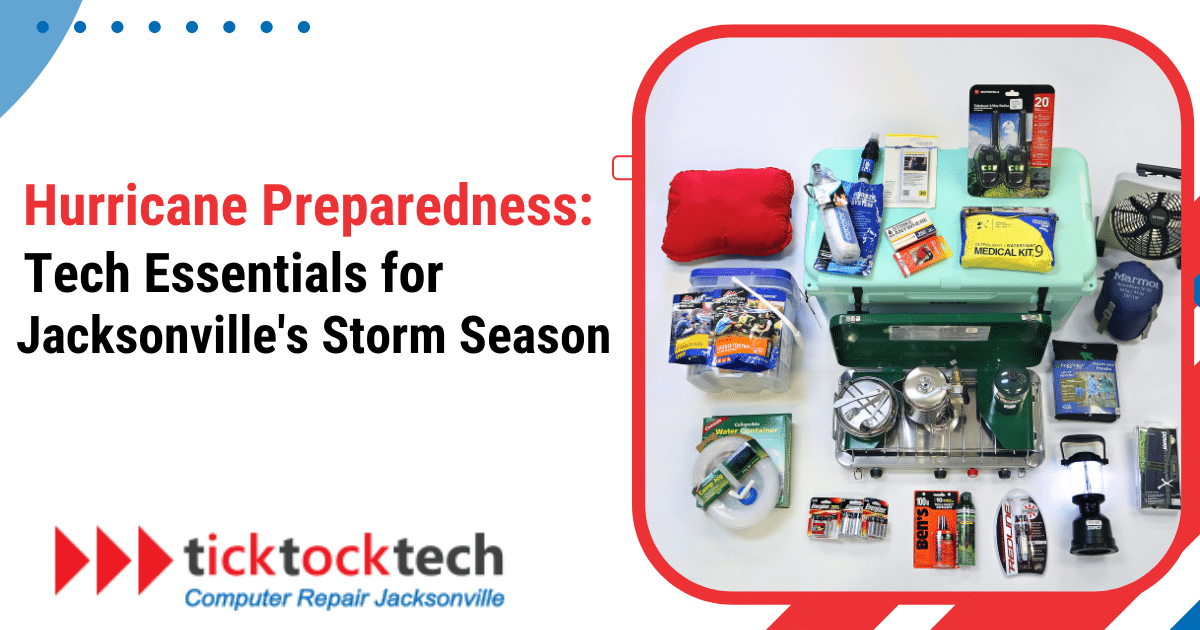As hurricane season approaches, residents of Jacksonville and its surroundings must be ready for the potential impacts of severe weather. Technology has become a crucial tool in preparing for and weathering these storms safely. Here, we outline essential tech tools and strategies to help Jacksonville residents stay safe during the hurricane season.
1. Weather apps
Stay informed with real-time weather updates by installing reliable weather apps on your smartphone. Apps like the National Weather Service app, Weather Underground, or NOAA Weather Radar Live provide timely alerts on hurricane developments. Customize your alerts to receive notifications specific to your location to ensure you’re never caught off guard.
2. Emergency alert systems
Ensure that your mobile devices are set up to receive Wireless Emergency Alerts (WEAs). These alerts are issued by governmental authorities and can provide critical information about severe weather, local emergencies requiring evacuation, and other significant alerts. These notifications must be enabled on your phone to receive instant updates.
3. Battery backups
Power outages are a common consequence of hurricanes. Having a reliable power bank or a battery backup can keep your devices running when you need them the most. For extended outages, consider investing in a solar-powered charger or a generator, but ensure you understand how to operate it safely and that it’s adequately ventilated. Power is a crucial tech during hurricane periods like in Jacksonville.
4. Communication apps
In times of emergency, maintaining communication with family and friends is vital. Apps like Zello, which works like a walkie-talkie, can be invaluable during a storm when phone lines and mobile networks might be unreliable. Also, ensure you have apps that support offline messaging or can send SMS texts, which are often more reliable in poor network conditions.
5. Data backup solutions
Before hurricane season, back up important documents and personal data. Use cloud storage services like Google Drive, iCloud, or Dropbox for digital backups of essential documents. Physical copies should be stored in waterproof containers.
6. Social media and local news apps
Platforms like Twitter and Facebook can be valuable resources for real-time updates and community support. Local news stations often have their apps, offering tailored advice, alerts, and live updates pertinent to Jacksonville. Be discerning about verifying the information shared on social media to avoid misinformation.
7. Smart home devices
For home security and monitoring, smart home devices can be highly beneficial. Devices like smart cameras, water sensors, and smart lights can be monitored remotely through smartphones. This can be particularly useful if you need to evacuate and want to monitor the state of your property.
8. Emergency services locator apps
Apps like FEMA or the American Red Cross apps provide information on nearby shelters and emergency services. Familiarize yourself with these apps and services before the storm season to know your options for emergency shelters and medical help.
9. GPS and offline maps
Having access to GPS and maps is crucial, especially if evacuation is necessary. Apps like Google Maps allow you to download maps for offline use, which is invaluable if cellular service is disrupted during the storm.
10. Online grocery and delivery services
Preparation is key, and stocking up on essentials well in advance of an incoming storm can prevent last-minute rushes. Utilize online grocery delivery services to stock up on non-perishable food, water, and other essentials without having to brave the crowds at stores.
Conclusion
By integrating these tech tools into your Jacksonville hurricane preparedness plan. You can significantly enhance your readiness and safety during Jacksonville’s storm season. Technology not only provides essential information and communication channels but also brings a certain peace of mind that can make facing a hurricane a more manageable ordeal. Remember, preparation is your best defense against the unpredictability of nature.
FAQs
A: Start by securing windows and doors with storm shutters or plywood. Clear your yard of any debris or loose items that could become projectiles. Ensure your roof is in good condition and trim any trees near your home. Stock up on emergency supplies like food, water, flashlights, and batteries. Finally, develop a family emergency plan and designate a safe room within your home.
A: Follow evacuation orders issued by local authorities. Pack essential items like medications, important documents, clothing, and emergency supplies. Ensure your vehicle has a full tank of gas and follow designated evacuation routes. If you have pets, make arrangements for their evacuation as well.
A: Back up important documents digitally using cloud storage services like Google Drive or Dropbox. Store physical copies in waterproof containers or safes. Consider investing in a waterproof and fireproof document bag for added protection. If evacuation is necessary, take these documents with you.
A: Use battery-powered devices like flashlights or lanterns for lighting. Avoid using candles to prevent fire hazards. Conserve battery power on your mobile devices by minimizing usage and turning off non-essential apps. If you have a generator, ensure it’s operated safely and never use it indoors.

